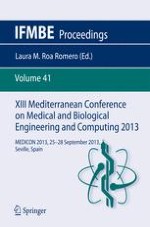2014 | OriginalPaper | Buchkapitel
Variability of EEG Theta Power Modulation in Type 1 Diabetics Increases during Hypo-glycaemia
verfasst von : A. Goljahani, A. S. Sejling, G. Sparacino, C. Fabris, J. Duun-Henriksen, L. S. Remvig, C. Cobelli, C. B. Juhl
Erschienen in: XIII Mediterranean Conference on Medical and Biological Engineering and Computing 2013
Aktivieren Sie unsere intelligente Suche, um passende Fachinhalte oder Patente zu finden.
Wählen Sie Textabschnitte aus um mit Künstlicher Intelligenz passenden Patente zu finden. powered by
Markieren Sie Textabschnitte, um KI-gestützt weitere passende Inhalte zu finden. powered by
EEG spectral content has been widely investigated to illuminate cognitive processes and assess clinical conditions of patients. In particular, increase of powers in EEG low frequency bands were proved to reflect low levels of glucose concentration in the blood, i.e., hypo-glycaemia states. In the present work we investigate if and how levels of glucose concentrations affect the time course of EEG power modulations in the conventional theta, alpha and beta bands. To this aim, the reactivity index
ρ
, recently introduced for characterizing individual modulations of alpha rhythms, was utilized to quantify, for each band, EEG power modulations at the P3-C3 channel during induced hypo-glycaemia experiments performed with 10 type-1 diabetic volunteers. Results show that, in any glycemic state, i.e., hyper/eu/hypo-glycaemia,
ρ
continuously vary in any band, alternating increases and decreases of powers with respect to preceding intervals. In particular, in the theta band, the variability of EEG power modulations during hypo-glycaemia (measured by the
ρ
sample standard deviation) is significantly higher than in hyper- and eu- gly- caemia. This suggests that the variability of
ρ
in the theta band can be a useful indicator to quantitatively investigate glucose-related EEG changes.
